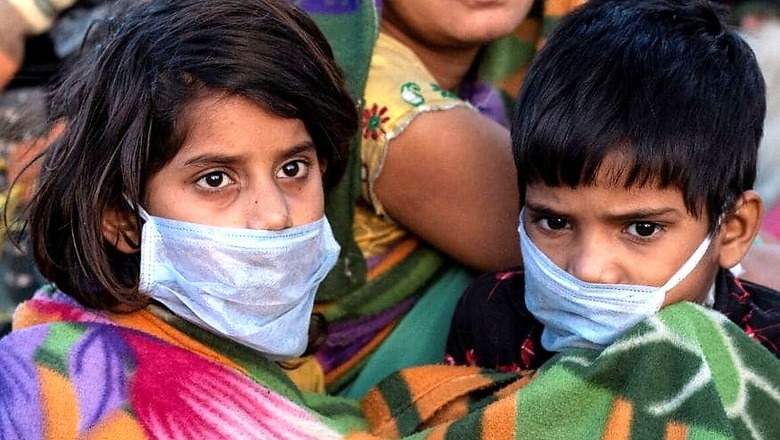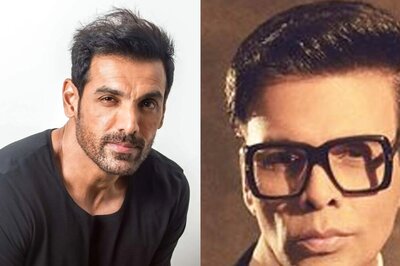
views
In the most recent episode of 'Surviving the Streets', a series of daily 10-minute news videos on YouTube, focussed exclusively on the state of India's poorest children during the three-week long national lockdown, reporters look downcast and use ominous phrases in their stories.
Shambhu, who reports from Sarai Kale Khan, says that children are telling him they see "chaaron taraf andhera (darkness in every direction)". Shanno, the reporter for north-east Delhi, says the kids have told her that "their will is breaking". One of the children, she says, broke down while talking to her on the phone. The child complained to her that when government schools were functioning, they used to get mid-day meals. Now he shares a piece of bread he gets once a day with his two other siblings. Some are subsisting only on water.
"Paani peeke rehte hain...soch rahe hain paidal nikal jayein...Abhi na to ghar hai na paise hain [We live through the day only on water...we're thinking of walking down to our villages...Right now we have neither home nor food]," Shambhu quotes a child telling him.
If one watches the series, which is perhaps the only news feature of its kind in India, chronologically, the anxiety in these children can be seen building up day by day. After all, they are the most vulnerable members of our society, who used to live and earn at bus stations, on railway platforms, etc. They talk with an increasing urgency about the lack of food, the sense of captivity. The national lockdown has begun to take a psychological and physical toll on them.
On day 2 of the lockdown, Vijay Kumar, reporting from west Delhi, says, "The children told us that they miss going out and playing in parks...now it feels like they're confined in 24-hour jails." On the same day, Shanno says, "Bachhe keh rahe hain bas 6-7 din ka raashan aur bacha hai. Duud ki bhi thodi kami hai. Is sab ke beech wo chidiya ud khel ke samay vyateet kar rahe hain (The children are saying that their families have just 6-7 days of rations left. Milk is in short supply. Amid all this, they're passing time playing the game chidiya ud)".
On day 3 of the lockdown, Poonam reports from Agra: "The children are saying they can't step out to work. And it has been pouring heavily. Muck is gathering around their slums. But they can't step out to catch a breath of fresh air. The stench is unbearable. Plus, all their clothes and eatables are soaking wet. The children say they're worrying that further confinement will make them ill."
Every day, five young reporters speak to hundreds of children - ragpickers, balloon sellers, beggars - and report on their most urgent concerns, which are getting more worrying by the day. Vijay Kumar from west Delhi, Shanno from north-east Delhi, Shambhu from Sarai Kale Khan, Poonam from Agra and Sumit from Lucknow.
Some of them used to report for Balaknama - a newspaper run by children who live and work on the streets. Since the lockdown made it tough for them to produce the newspaper, these reporters shifted to the visual medium and continued telling their stories.
The reason that these reporters have access and trust of so many children is because all five of them have lived this life. In fact, they still continue to live in urban slums where they were born. They know their subjects quite intimately. They understand what 24/7 confinement can do to a child who does not have access to luxuries like phones, internet, television and gaming consoles.
"The children who earned and lived as ragpickers, they are used to roaming on the streets, in free spaces. Now you have put them in confined spaces, often in hostile circumstances where sometimes they're forced to watch domestic violence and have no way of escaping that," Shambhu who lives in Sarai Kale Khan tells News18.
He says that when he speaks to the children, he can sense their spirits falling lower and lower, and wonders, "Could the government not make any provisions to let them out for only two hours? They could play in public parks, refresh themselves and return to their homes?"
The news reports in 'Surviving the Streets' feature children also who, with their faces pixelated, often address their viewers directly. One child says in the day 2 report, "The ration has run out. Even relatives are not helping us. Provisions at grocery stores have become quite expensive. Fights between people have increased...we don't even have money to return to our village."
Sanjay Gupta, who leads Chetna, the child rights organisation that runs and supports Balaknama and 'Surviving the Streets', worries that continued isolation of street children may force them into crime.
"A lot of them have defunct families. In many cases we are seeing the same script play out- father is an alcoholic, mother was the only source of income at home, who is getting beaten up because her husband isn't getting her fill. Some of the children in such families abuse chemicals. If they don't find food or substance to abuse or timely counselling, I fear that a lot of them will slip into crime," Gupta, who has been working in the field of children's rights for 25 years now, says.
Children on the street, he adds, are facing immense trauma and great insecurity. And they aren't even getting any help from government relief camps, he says.
"There are roughly 2 lakh street children in Delhi...since their sources of livelihood have been suspended they are entirely dependent on the government for their survival now. Except, they are invisible for the government. These children don't have any identification cards. And they choose to stay away from government functionaries. So services cannot reach them, which makes them even more vulnerable," Gupta adds.
The situation could have been better if organisations working for child rights were also included in 'essential services', and were allowed to travel, he says. "Physical presence is very necessary for these children. To give them a healing touch. To counsel them. Unfortunately the government isn't issuing us any curfew passes. But we are trying the best we can to support them over the phones," Gupta says.



















Comments
0 comment